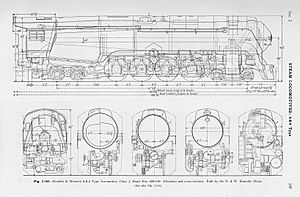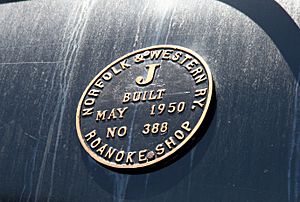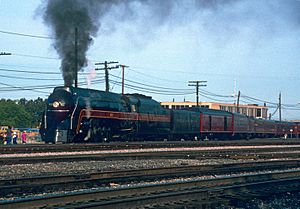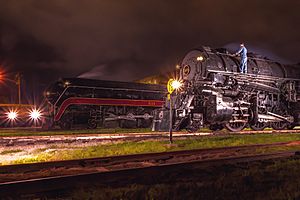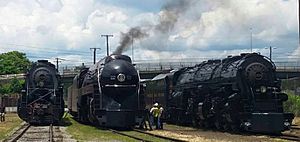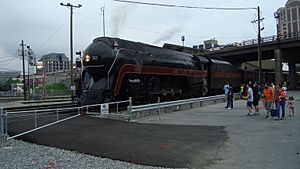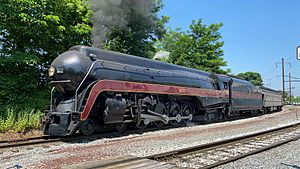Norfolk and Western 611 facts for kids
Quick facts for kids Norfolk and Western 611 |
|
| Power type | Steam |
|---|---|
| References: | |
| Designer | Franklin C. Noel |
| Builder | N&W's Roanoke Shops (East End Shops) |
| Serial number | 388 |
| Build date | May 29, 1950 |
| Rebuild date | October 1981–July 1982 June 2014–March 2015 |
| Configuration | 4-8-4 |
| UIC classification | 2′D2′ h2 |
| Gauge | 4 ft 8 1⁄2 in (1,435 mm) standard gauge |
| Leading wheel diameter | 36 in (914 mm) |
| Driver diameter | 70 in (1,778 mm) |
| Trailing wheel diameter | 42 in (1,067 mm) |
| Length | 109 ft 2 in (33.27 m) |
| Width | 11 ft 2 in (3.40 m) |
| Height | 16 ft 0 in (4.88 m) |
| Axle load | 72,000 lb (32.7 tonnes) for drivers |
| Weight on drivers | 288,000 lb (130.6 tonnes) |
| Locomotive weight | 494,000 lb (224.1 tonnes) |
| Tender weight | 378,600 lb (171.7 tonnes) |
| Locomotive and tender combined weight | 872,600 lb (395.8 tonnes) |
| Fuel type | Coal |
| Fuel capacity | 35 t (34 long tons; 39 short tons) |
| Water capacity | 20,000 US gal (76,000 L; 17,000 imp gal) |
| Fuel consumption | 6.5 t (6.4 long tons; 7.2 short tons) of coal per hour 11,975 US gal (45,330 L; 9,971 imp gal) of water per hour |
| Boiler | 102 in (2,591 mm) |
| Boiler pressure | 300 psi (2.07 MPa) |
| Feedwater heater | Worthington Type G5-A |
| Fire grate area | 107.7 sq ft (10.01 m2) |
| Heating surface: Tubes | 2.25 in (57 mm) |
| Heating surface: Flues | 3.5 in (89 mm) |
| Heating surface: Tubes and flues | 4,693 sq ft (436.0 m2) |
| Heating surface: Firebox | 578 sq ft (53.7 m2) |
| Heating surface: Total | 5,271 sq ft (489.7 m2) |
| Superheater area | 2,177 sq ft (202.2 m2) |
| Cylinders | Two, outside |
| Cylinder size | 27 in × 32 in (686 mm × 813 mm) |
| Valve gear | Baker |
| Valve type | 14-inch (356 mm) Piston valves, 8.5-inch (216 mm) travel |
| Power output | 5,100 hp (3,800 kW) @ tender drawbar |
| Tractive effort | 80,000 lb (36.3 tonnes) |
| Factor of adhesion | 3.6 |
| Number in class | 12 of 14 |
| Nicknames |
|
| Retired | October 27, 1959 (revenue service) December 7, 1994 (1st excursion service) |
| Restored | July 5, 1982 (1st restoration) March 31, 2015 (2nd restoration) |
| Current owner | Virginia Museum of Transportation |
| Disposition | Undergoing maintenance in Strasburg, Pennsylvania |
Norfolk and Western 611 is a famous steam locomotive. It is also known as the "Spirit of Roanoke" and the "Queen of Steam". This powerful engine was built in May 1950 by the Norfolk and Western (N&W) railway's own shops in Roanoke, Virginia.
No. 611 is a "Class J" locomotive, meaning it was part of a special group of engines. It has a "4-8-4" wheel arrangement, which means it has 4 small wheels in front, 8 large driving wheels in the middle, and 4 small wheels at the back. It was also "streamlined," meaning it had a smooth, aerodynamic shape for speed. It was one of the last steam passenger locomotives ever built in the United States. Many people see it as a top example of steam engine technology.
This locomotive was used to pull N&W's most important passenger trains. It traveled between Norfolk, Virginia, and Cincinnati, Ohio. It also helped pull Southern Railway passenger trains between Lynchburg, Virginia, and Bristol, Tennessee. In 1959, it stopped regular service and was given to the Virginia Museum of Transportation (VMT) in 1962. It was the only one of its kind left.
In 1982, Norfolk Southern (NS), the company that took over N&W, brought No. 611 back to life. It was used for special excursion trips for many years. It became a big star of their steam program, pulling trains all over the eastern United States. In 1984, it was named a National Historic Mechanical Engineering Landmark. This means it's a very important machine in history. In 1994, NS stopped its steam program because of high costs, and No. 611 was retired again. It went back to the VMT.
In 2013, the VMT started a project to raise money to restore No. 611 again. They raised $3.5 million, and the locomotive returned to service in mid-2015. In 2017, the state of Virginia officially named No. 611 its "official state steam locomotive." Since then, it has continued to run special trips. As of 2022, No. 611 is getting maintenance and inspections in Strasburg, Pennsylvania.
Contents
History of the Queen of Steam
Designing a Powerful Engine (1941-1945)
During World War II, the Norfolk and Western (N&W) railway needed stronger locomotives. Their old engines couldn't handle the growing number of passengers, especially over the Blue Ridge Mountains. So, N&W's engineers created a new, very powerful steam locomotive. This was the "Class J 4-8-4 Northern." They built 14 of these engines at their shops in Roanoke, Virginia, between 1941 and 1950.
The Class Js were the strongest steam engines N&W had for passenger service. They had large driving wheels and could pull with great force. They could also reach high speeds. These engines were very reliable, often traveling more than 15,000 miles (24,140 km) each month. Some even traveled over 3,000,000 miles (4,828,030 km) in their lifetime. Franklin C. Noel designed their sleek, streamlined look. They were painted black with a red stripe and gold details.
One of these engines, No. 610, was even loaned to the Pennsylvania Railroad in 1944-1945. It pulled many passenger cars at speeds over 110 mph (177 km/h). The Class Js were known for their power and speed. They ran smoothly even on N&W's hilly routes. Along with two types of freight locomotives, the Class Js were part of N&W's "Big Three" steam engines. They showed how advanced steam locomotive technology had become.
Working and First Retirement (1950–1959)
No. 611 was the twelfth Class J locomotive built. It was also one of the very last steam passenger engines made in the United States. It started its regular service on May 29, 1950. It cost about $251,544 to build.
No. 611 and its sister engines pulled N&W's famous passenger trains. These included the Powhatan Arrow and the Pocahontas. They ran between Norfolk, Virginia, and Cincinnati, Ohio. They also helped pull Southern Railway trains between Lynchburg, Virginia, and Bristol, Tennessee.
In 1952, No. 611 even pulled a special train for Dwight D. Eisenhower's presidential campaign. He later became president.
In the late 1950s, N&W started using diesel engines more. They wanted to see if diesels were cheaper to run and maintain. They leased some diesel engines and then ordered new ones to replace their Class J steam engines.
All the Class J engines, except No. 611, were retired and taken apart between 1958 and 1959. No. 611 was chosen to pull two "Farewell To Steam" trips in October 1959. After these trips, No. 611 was retired from regular service on October 27, 1959. It then worked as a steam generator at the East End Shops. In 1962, it was donated to the Roanoke Transportation Museum. It was in great shape, even after an accident in 1956. It was put on display at Wasena Park.
First Return to Service (1982–1994)
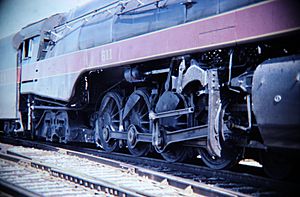
In 1981, Robert Claytor, the president of N&W, decided to bring No. 611 back for special trips. It was moved to a shop in Irondale, Alabama, for repairs. Its firebox was fixed, and other parts were rebuilt or replaced.
On July 5, 1982, No. 611 was steamed up for the first time in 23 years! It took over from another steam engine for excursion service. Around this time, N&W and Southern Railway joined to form Norfolk Southern (NS). NS continued the steam program, giving No. 611 more tracks to run on. Robert Claytor became the first leader of NS. He even drove No. 611 on its return trip to Roanoke on August 20, 1982. When it arrived, he proudly called it "Roanoke Born, Roanoke Bred, and Roanoke Proud."
No. 611 started its first public trip on Labor Day weekend. It pulled a special train to Norfolk, Virginia. During this trip, the locomotive briefly went off the tracks while being turned around. It was quickly repaired and continued its trips.
In 1983, No. 611 pulled many public and private trips. It even ran with another steam engine, No. 750, on some trips. It also traveled to the Midwest, running trips out of Chicago and St. Louis.
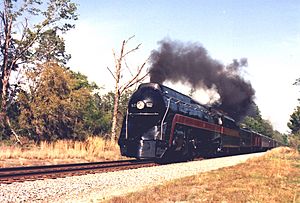
On May 19, 1984, No. 611 was named a National Historic Mechanical Engineering Landmark. This was a big honor! It continued to pull many exciting trips, sometimes with other famous steam engines like Nickel Plate Road 765 and N&W 1218. In 1989, it pulled a special train with ten matching red passenger cars, celebrating 40 years of the Powhatan Arrow train.
In 1991, for the Norfolk Southern steam program's 25th anniversary, No. 611, No. 1218, and Southern Railway 4501 ran together. They pulled a huge 28-car train.
In 1992, No. 611 pulled trips over the Saluda Grade in North Carolina. This is the steepest main line railway grade in the United States. To climb it safely, the train had to be split into two parts. No. 611 pulled the last five cars up the very steep part.
In 1994, NS decided to end its steam program. This was due to rising insurance and maintenance costs. On December 3, 1994, No. 611 pulled its last NS steam-powered trip. It returned to Roanoke on December 7. That evening, its fire was put out for the last time. It was the last steam locomotive to run on the NS system in the 1900s.
Second Retirement (1994–2014)
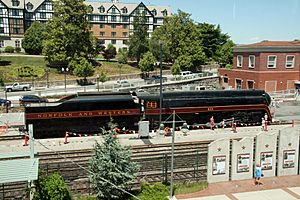
After 12 years of special trips, No. 611 was stored at the East End Shops. In October 1995, it was given to the City of Roanoke. It was put on display at the Virginia Museum of Transportation (VMT). In 2003, it was joined by No. 1218, another N&W engine.
In 2011, the Roanoke City Council named No. 611 "The Spirit of Roanoke." The VMT had this name written on the locomotive's cab. In 2012, the City of Roanoke officially gave both No. 611 and No. 1218 to the VMT.
Second Return to Service (2015–Present)
In 2011, Norfolk Southern's CEO, Wick Moorman, brought back the steam program. This made people wonder if No. 611, also called the Queen of Steam, would run again. In 2013, the VMT formed the "Fire Up 611!" committee to see if it was possible. People who had worked with No. 611 before joined the committee.
Tests showed that No. 611 was in great shape for restoration. The VMT started a fundraising campaign to raise $3.5 million. They raised $2.5 million, and Norfolk Southern donated another $1.5 million from selling a painting.
In March 2014, after getting donations from thousands of people, the committee made a deal with the North Carolina Transportation Museum (NCTM). They would use the museum's roundhouse to restore No. 611.
On May 24, 2014, No. 611 was moved to the NCTM. The restoration work began on June 2, 2014. Workers and volunteers took the locomotive completely apart. They installed new parts and made sure it met all safety rules.
On February 23, 2015, No. 611's boiler passed a water pressure test. It was test-fired on March 31. The locomotive was then put back together and repainted. On May 9, No. 611 moved on its own power for the first time in almost 21 years! After some test runs, it completed a main line test run on May 21.
On May 30, 2015, No. 611 began its trip home to Roanoke. The next day, it was reunited with No. 1218 and another engine, No. 2156, at the VMT.
No. 611 ran several special trips in Virginia during the summer of 2015. These included The American and The Powhatan Arrow. After this, NS ended its "21st Century Steam" program. However, No. 611 continued to pull trips on NS tracks.
In 2016, No. 611 received new front wheels. It then ran more trips, including The Virginian and The Blue Ridge Special. It also offered special experiences at the NCTM, like cab rides and caboose rides.
In 2017, No. 611 went for its yearly inspection. It ran more trips, including The Roanoker and The Cavalier. In May, the state of Virginia officially named No. 611 the "Official Steam Locomotive of Virginia." It ran its last main line trips out of Roanoke that year.
In 2018, No. 611 could not run main line trips due to new rules. But it still visited the NCTM for maintenance and special events. The VMT also started raising money to add new safety technology called Positive train control (PTC) to No. 611.
In 2019, No. 611 visited the Strasburg Rail Road (SRC) in Pennsylvania for special "N&W Reunion of Steam" events. Because it didn't have PTC, a diesel locomotive had to lead it to Strasburg. There, No. 611 joined another N&W steam engine, No. 475. This was the first time two N&W steam engines had run together since 1991.
In 2020, the COVID-19 pandemic limited No. 611 to static display. But it was still steamed up for special in-cab experiences. In 2021, it returned to SRC for more weekend trips and tours. After these events, No. 611 stayed at Strasburg for its yearly inspection and maintenance.
Accidents and Safety
Even famous locomotives like No. 611 have been involved in accidents. These events often led to important safety changes.
- On June 20, 1953, No. 611 was pulling a train when it hit a truck at a crossing in West Virginia. The truck driver was injured.
- Four days later, it was in another crossing accident in Ohio. It hit a truck, causing some damage to its front. It was quickly repaired.
- On January 23, 1956, No. 611 was pulling a train when it went off the tracks in West Virginia. The locomotive fell down a bank and landed on its side. The engineer was killed, and several other crew members and passengers were injured. No. 611 was repaired and continued to run for three more years. The dents on its tender from this accident were finally removed during its 2014-15 restoration.
- On May 18, 1986, No. 611 was pulling an employee train in Virginia. Two passenger cars hit a faulty switch and went off the tracks. The locomotive and some cars stayed on the rails. Many people were injured, and some needed hospital care. After this accident, Norfolk Southern decided to limit the speed of its steam excursions to 40 mph (64 km/h). They also stopped using older passenger cars that didn't have modern safety couplers.
No. 611 in Popular Culture
- No. 611 was the star of a 1983 documentary video called Going Home. It showed the locomotive's first restoration and return to Roanoke.
- The locomotive is shown on Virginia's "Railway Heritage" license plate.
- No. 611 was featured in a 2015 children's book called Dash Dupree and the Queen of Steam.
- It was also featured in a 2016 documentary film called 611: American Icon, which tells its whole story.
Images for kids
-
Norfolk and Western Class J No. 611 sitting on the turntable at the North Carolina Transportation Museum in Spencer, North Carolina, on May 23, 2015
-
A close-up of No. 611's running gear in 1985.
-
No. 611 approaching Valdosta, Georgia, with the Suwanee Steam Special excursion trip from Jacksonville, Florida, in April 1992
-
No. 611 on static display next to the O. Winston Link Museum during National Train Day 2010
 | James Van Der Zee |
 | Alma Thomas |
 | Ellis Wilson |
 | Margaret Taylor-Burroughs |


